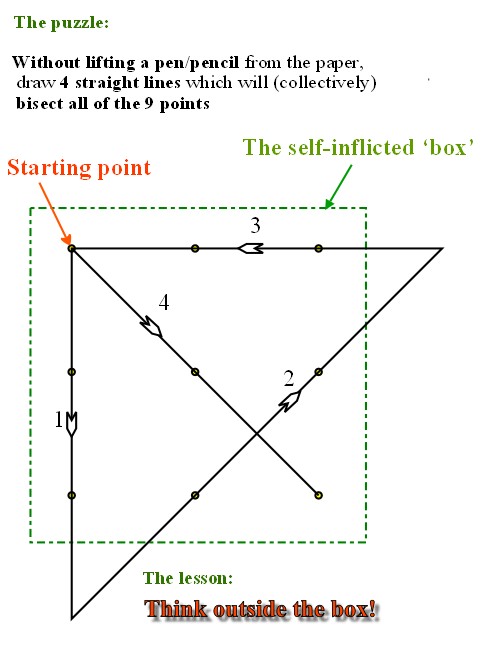|
Connecting the dots solution
The solution to the 'connecting the dots' puzzle is given below. And the point of the exercise, below that.

Now the Bereans were of more noble character than the Thessalonians, for they received the message with great eagerness and examined the Scriptures every day to see if what Paul said was true. (Acts 17:11)
We are all - to one degree or another - products of the 'conditioning' and of our upbringing, and we are all capable of believing all that we have been taught in the process and learn from the behaviour around us. This is as true of Christians as it is of anyone else.
And this is why Paul commended his Berean audience (Acts 17:11)for their diligence in not trusting even the apostle himself. He urged them to 'check out' what he was saying from the Scriptures for themselves. There are in fact many church traditions which do not find a scriptural support:
- Jesus was not born at Christmas¹
- the early Celtic church had their weekly 'Shabbat' on a Saturday ²
- the crucifixion couldn't have taken place on Friday ³
But it is very easy to fall into the trap of just believing things to be true rather than examining the Truth for ourselves. As an exercise, compare the features, habits and activities of the early Christians (Acts 2:42 - 47; 4:32 - 35) and then set these against what we now regard as 'church'. Then imagine what you (and others) might do if every minister/pastor was called to the foreign mission field and every building which we call 'a church' fell down. 1. The shepherds would not have been 'in the fields' in the middle of Winter. From the timings of the conceptions of John the Baptist and Jesus, and the period when John's father (Zephaniah) was on temple duty (Luke 1:5; 1 Chron. 24:10) it is most likely that Jesus was born in October. 2. In their Introduction to 'Adomnan's Life of Columba', (pp 25/26) the editors shed light, not only on Columba's seventh day Sabbath-keeping practice, but on the gradual 'adjustment' of manuscripts by generations of Roman copyists, in an attempt to provide an impression that the Celtic saints held Sunday sacred. Adomnan's use of sabbatum for Saturday, the seventh day of the week, is clear indication from Columba's mouth that Sabbath was not Sunday. 3. See footnotes 'Easter myths obscure the wonder of it all' in the article 'Calvary hidden in Passover Seder'. The Bible tells us that Jesus's death and resurrection would be like Jonah in the whale - 3 days and 3 nights (Matt 12:40).
|
Christians Together, 02/07/2009
|
|
|
|